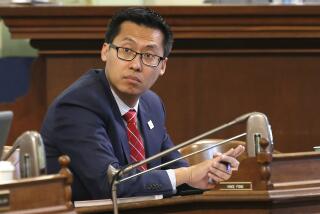Beilenson Political Libel Lawsuit Has New Day in Court
- Share via
VENTURA — The political battle between Democratic Rep. Anthony C. Beilenson and his Republican foe in his last congressional race flared again Thursday as their attorneys and appellate court justices dissected attack mailers sent in the final days of the heated 1994 campaign.
An attorney for Beilenson, a Woodland Hills Democrat, who defeated Republican challenger Rich Sybert two years ago, asked a three-justice panel to toss out a lawsuit by Sybert that claims he was libeled by campaign fliers.
“You can get a little blustery in a robust campaign,” attorney Roger Harris told the panel justices of the 2nd District Court of Appeal in Ventura. He said the flier was part of the free-flowing exchange of ideas during political campaigns and is protected by the U.S. Constitution’s right to free speech.
But Sybert attorney Charles Bell urged the justices to let the case go forward, arguing that Beilenson “should not be permitted to hide deliberate libel behind false claims of free speech.”
Sybert is mounting his second campaign to take Beilenson’s seat in Congress. The seat represents most of Thousand Oaks, Malibu and western portions of the San Fernando Valley.
Although Beilenson has decided to retire at the end of the year, Sybert is pressing ahead with his lawsuit.
“Some people think it’s sour grapes, but it’s not,” Bell said after Thursday’s court hearing. “Rich felt he was defamed and felt he lost the election because of this.” Sybert lost by 3,536 votes.
The lawsuit focuses on campaign mailers that attacked Sybert for collecting $140,000 in private legal fees while holding a $98,000-a-year job as the governor’s director of planning and research from 1991 to 1993.
In his original complaint, Sybert cited one flier that proclaimed “Rich Sybert Ripped off California Taxpayers,” and another that said, “Rich Sybert’s record in office tainted by conflict of interest.”
Sybert had continued his private law practice while on the governor’s staff, but he had the approval of the California Fair Political Practices Commission that there was no impropriety in doing so.
His lawsuit claims the mailers accuse him of “criminal conduct and personal dishonesty.”
Beilenson maintains there was no defamatory language, that the fliers were fair political comment on undisputed facts about his two sources of income.
Superior Court Judge Barbara A. Lane refused to throw out the lawsuit in November, saying there was the “possibility” that Sybert could persuade a jury that he had been libeled.
So Beilenson took the case to the Court of Appeal, where Justice Arthur Gilbert on Thursday seemed to agree with Beilenson’s assessment that Judge Lane had inadvertently applied the wrong legal standard.
“I think she made a mistake,” Gilbert said during the hearing. “She thought there was a possibility that [Sybert] could win. The statutory language is ‘probability’ of winning. It is clearly a ‘probability’ that has to be shown.”
During the give-and-take with lawyers, Gilbert questioned if Sybert’s case can actually prove the fliers damaged his reputation by accusing him of a crime. “Just because you say something is unethical, doesn’t mean it is illegal,” the justice said.
But Justice Kenneth R. Yegan asked why the fliers put quotation marks around “legal fees,” and whether that implied that somehow the fees or services were inappropriate.
“A reasonable jury could come to a rational decision that he was accused of committing a crime,” Yegan said. “And if that’s so why shouldn’t it go to trial?”
Presiding Justice Steven J. Stone did not comment during the oral arguments. The panel usually issues a ruling within a few weeks of hearing arguments in the case, according to the clerk’s office.
More to Read
Get the L.A. Times Politics newsletter
Deeply reported insights into legislation, politics and policy from Sacramento, Washington and beyond. In your inbox twice per week.
You may occasionally receive promotional content from the Los Angeles Times.









